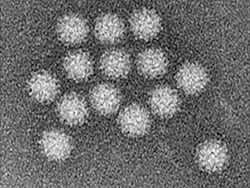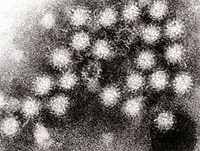New Norovirus Strain Hits US
Drug & Reference Information
In the middle of a punishing influenza season, a
new strain of norovirus from Australia has come on the scene, and it is
not yet clear how nasty this bug will be, the Centers for Disease
Control and Prevention (CDC) announced today.
In its latest Morbidity and Mortality Weekly Report, the CDC identified the Aussie newcomer as GII.4 Sydney. First spotted in March 2012, the strain already has triggered acute gastroenteritis outbreaks in the United Kingdom and other countries. During the last 4 months of 2012, GII.4 Sydney accounted for 53% of 266 norovirus outbreaks in the United States reported through an electronic laboratory surveillance system called CaliciNet. Roughly half of the Sydney outbreaks resulted from direct person-to-person transmission; another 20% were foodborne.
Two thirds of the US outbreaks of GII.4 Sydney have occurred in long-term care facilities.
The CDC stated that GII.4 Sydney appears to have replaced a previously dominant strain called GII.4 New Orleans. In general, GII.4 strains are associated with higher rates of hospitalization and death.
 The emergence of a new norovirus
strain such as GII.4 Sidney often leads to "increased outbreak
activity," but not all the time, according to the CDC. The agency said
that it is premature to assess the relative magnitude of GII.4 Sydney
because during the previous 3 winters, "the peak in reported norovirus
outbreaks occurred in January." However, the CDC urged clinicians to be
on the lookout for a potential rise in norovirus cases in the coming
weeks.
The emergence of a new norovirus
strain such as GII.4 Sidney often leads to "increased outbreak
activity," but not all the time, according to the CDC. The agency said
that it is premature to assess the relative magnitude of GII.4 Sydney
because during the previous 3 winters, "the peak in reported norovirus
outbreaks occurred in January." However, the CDC urged clinicians to be
on the lookout for a potential rise in norovirus cases in the coming
weeks.
"Proper hand hygiene, environmental disinfection, and isolation of ill persons remain the mainstays of norovirus prevention and control," the CDC noted.
The foremost clinical hazard of any norovirus infection — especially for the elderly — is dehydration caused by vomiting and diarrhea, said William Schaffner, MD, an infectious disease expert at Vanderbilt University Medical Center in Nashville, Tennessee.
In severe cases, Dr. Schaffner told Medscape Medical News, oral fluids and electrolyte replacement may need to give way to intravenous fluids. Patients also require attentive care lest a rush to the bathroom together with faint-headedness lead to a stumble, a fall, and a head injury, he said.
Morb Mortal Wkly Rep. 2013;62:55. Full text
In its latest Morbidity and Mortality Weekly Report, the CDC identified the Aussie newcomer as GII.4 Sydney. First spotted in March 2012, the strain already has triggered acute gastroenteritis outbreaks in the United Kingdom and other countries. During the last 4 months of 2012, GII.4 Sydney accounted for 53% of 266 norovirus outbreaks in the United States reported through an electronic laboratory surveillance system called CaliciNet. Roughly half of the Sydney outbreaks resulted from direct person-to-person transmission; another 20% were foodborne.
Two thirds of the US outbreaks of GII.4 Sydney have occurred in long-term care facilities.
The CDC stated that GII.4 Sydney appears to have replaced a previously dominant strain called GII.4 New Orleans. In general, GII.4 strains are associated with higher rates of hospitalization and death.
 |
|
GII.4 Sydney strain of norovirus
|
"Proper hand hygiene, environmental disinfection, and isolation of ill persons remain the mainstays of norovirus prevention and control," the CDC noted.
The foremost clinical hazard of any norovirus infection — especially for the elderly — is dehydration caused by vomiting and diarrhea, said William Schaffner, MD, an infectious disease expert at Vanderbilt University Medical Center in Nashville, Tennessee.
In severe cases, Dr. Schaffner told Medscape Medical News, oral fluids and electrolyte replacement may need to give way to intravenous fluids. Patients also require attentive care lest a rush to the bathroom together with faint-headedness lead to a stumble, a fall, and a head injury, he said.
Morb Mortal Wkly Rep. 2013;62:55. Full text
Latest in Infectious Diseases
Medscape Medical News © 2013
WebMD, LLC
Send comments and news tips to news@medscape.net.
Send comments and news tips to news@medscape.net.
Cite this article: New Norovirus Strain Hits US. Medscape. Jan 24, 2013.

No comments:
Post a Comment